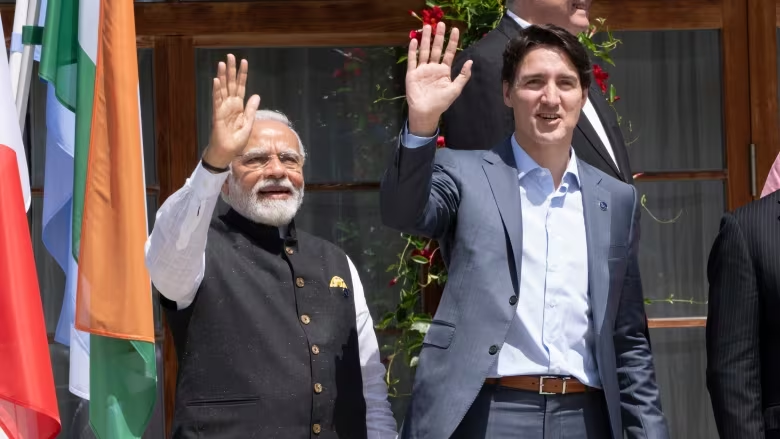
Prime Minister Justin Trudeau and Indian Prime Minister Narendra Modi greet each other with a wave in a family photo captured at the G7 Summit in Schloss Elmau on Monday, June 27, 2022, as seen in an image by Paul Chiasson for the Canadian Press.
In a recent interview with CBC's Rosemary Barton, Prime Minister Justin Trudeau expressed his belief that the relationship between India and Canada has experienced a notable shift in tone following the unsealing of a U.S. indictment alleging a conspiracy to murder a Sikh activist on U.S. soil. Trudeau's public statement in the House of Commons on September 18, linking India to the shooting death of Sikh activist Hardeep Singh Nijjar in Surrey, B.C., was met with scorn and denials from Indian Prime Minister Narendra Modi's government.
The recent U.S. indictment suggests that Indian government agents were not only instigators but also financiers of a murder plot in New York City, with connections to the killing of Nijjar and a scheme to target Canadians. Trudeau revealed that he went public with the allegations after unsuccessful quiet diplomacy, aiming to deter potential attacks on Canadian territory by Indian agents.
Modi himself remained aloof, but Indian government officials, including Foreign Minister S. Jaishankar, initially dismissed Canada's claims as baseless. However, the tone softened as other G7 countries, particularly the United States, supported Canada in the dispute. President Joe Biden raised the issue with Modi during their G20 summit meeting, though the public was unaware of the U.S.'s ongoing investigation into a plot to assassinate U.S.-Canadian dual citizen Gurpatwant Singh Pannun.
The U.S. indictment outlines a complex scenario, alleging that Indian officials in New Delhi offered $100,000 to hire a hitman to kill Pannun in New York. Intercepted communications between the parties discussed both the Pannun and Nijjar plots, indicating a level of coordination. Trudeau believes the U.S. indictment has prompted a more subdued response from the Modi government, acknowledging a possible understanding that bluster may not resolve the issue.
Trudeau emphasized the importance of collaboration and suggested a change in India's attitude, stating that relentless attacks against Canada may not be a solution. While the U.S. indictment provides more detailed evidence than Canada's allegations, the significant difference lies in the U.S.'s greater global influence compared to Canada. Tensions with Washington have the potential to harm India and the Modi government more significantly.
The U.S. has continued to express concern about the alleged murder-for-hire plot, as evidenced by FBI Director Christopher Wray's recent visit to New Delhi. In response, India's Ministry for External Affairs announced the establishment of a high-level commission of inquiry to investigate the Pannun case. Despite public messages emphasizing the need for an investigation, officials in both the U.S. and Canada privately doubt that the Modi government was unaware of the alleged assassination plot, suggesting a possible state-directed operation.
The Biden administration conveyed its concerns to a group known as the "Samosa caucus," comprising influential Indian-American members of Congress. In a confidential briefing, they warned that the actions outlined in the indictment could damage the significant partnership between the U.S. and India. Trudeau echoed similar sentiments in his CBC year-end interview, expressing Canada's commitment to standing up for people's rights, safety, and the rule of law, while also expressing a desire to continue collaboration on trade and the Indo-Pacific strategy with India.















